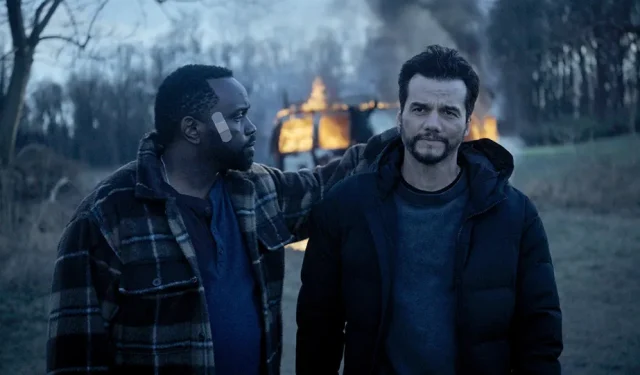Exploring Apple TV+’s “Dope Thief”: A Thrilling Dive into Crime and Desperation
“Dope Thief,”based on Dennis Tafoya’s gripping novel, is an engrossing entry in the crime fiction genre that captivates with its portrayal of longtime friends who navigate a treacherous path of petty crime born out of shared trauma. While the series teeters on the edge of being a buddy comedy, it firmly establishes itself as a darkly humorous thriller steeped in the stark reality of economic hardship.
A Promising Start with Compelling Characters
The series features the electrifying performances of Brian Tyree Henry and Wagner Moura, whose complicated relationship reflects the deep bonds forged through adversity. Their characters, Ray and Manny, embody the essence of survival in their gritty Philadelphia backdrop, while series creator Peter Craig masterfully captures the raw vernacular of their world. Under the direction of Ridley Scott, the pilot episode immerses viewers in the urban grit and atmospheric tension of the story’s setting.
From Small Crimes to Larger Consequences
The narrative kicks off with Ray and Manny engaging in small-time drug busts under the guise of DEA agents, pocketing funds they justify as a “karma tax” on local dealers. Despite momentary successes, both characters grapple with their personal struggles, including addiction and financial instability. As Ray, currently living with a supportive figure named Theresa, and Manny, attempting to maintain a relationship with his girlfriend Sherry, their precarious existence reflects a broader commentary on the gig economy’s harsh reality.
The Turning Point of Their Journey
The duo’s next “job” comes from a former prison acquaintance, leading them to a seemingly low-risk meth operation. However, the stakes quickly escalate, resulting in fatal consequences and putting them at the mercy of both law enforcement and a menacing biker gang driven by a mysterious figure who commands from the shadows, reminiscent of iconic antiheroes.
The Influence of Directorial Vision
Scott’s directorial prowess shines in the pilot, setting a high bar that subsequent episodes, directed by various newcomers, struggle to meet. While the series deserves credit for ambitious storytelling, the pilot’s intensity and aesthetic finesse are challenging to replicate, leaving viewers longing for the captivating energy captured in its inaugural hour. For many, this sets a precedent that the remaining episodes fail to fulfill.
Parallels to Social Commentary
At its best, “Dope Thief”draws parallels with films like Andrew Dominik’s “Killing Them Softly,”which critiques the aftermath of the 2008 financial crisis. In a world still reeling from COVID’s economic fallout, Ray and Manny’s desperate antics illustrate the ripple effects of supply chain disruptions on both legitimate and illicit businesses. Their journey embodies a potent narrative of desperation, where the characters’ confinement leads to reckless choices.
Character Dynamics and Missed Opportunities
As the series unfolds, it grapples with pacing issues, particularly in the second half, where the separation of its two leads diminishes the emotional core. The narrative’s focus shifts to less compelling subplots and underdeveloped characters, particularly among the law enforcement figures, leaving viewers wanting more engagement with the protagonists. Notably, the character of Mina, portrayed by Marin Ireland, adds a layer of intrigue, yet the overall character development often falters.
Performance Highlights and Critical Reception
Brian Tyree Henry shines as Ray, showcasing his range and ability to anchor the series even amidst less dynamic interactions. His portrayal encapsulates the humor, heartache, and resolve that defines his character’s journey. Conversely, while Moura’s Manny exudes charisma, his limited screen time in the narrative’s latter half detracts from the overall impact. Though “Dope Thief”offers moments of pulpy entertainment, it struggles with uneven pacing and frequent tonal shifts.
Ultimately, “Dope Thief”presents an intriguing mix of dark humor and social commentary, making it a notable addition to the crime thriller genre, despite its shortcomings. While the series has its highs and lows, Henry’s performance remains a constant highlight, reassuring viewers of his talent as a lead.


